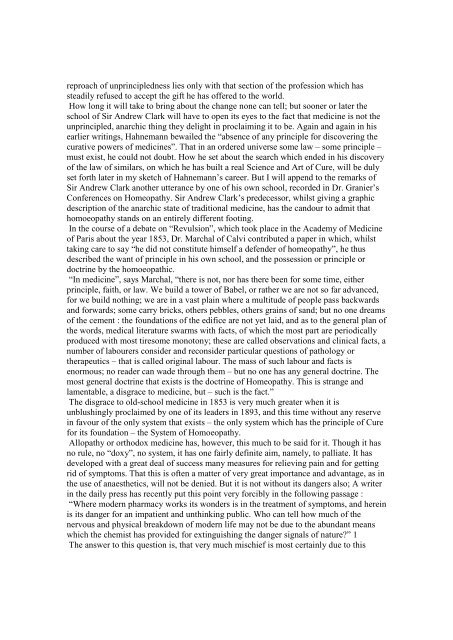CLARKE JH, Homoeopathy Explained - Classical Homeopathy Online
CLARKE JH, Homoeopathy Explained - Classical Homeopathy Online
CLARKE JH, Homoeopathy Explained - Classical Homeopathy Online
Create successful ePaper yourself
Turn your PDF publications into a flip-book with our unique Google optimized e-Paper software.
eproach of unprincipledness lies only with that section of the profession which has<br />
steadily refused to accept the gift he has offered to the world.<br />
How long it will take to bring about the change none can tell; but sooner or later the<br />
school of Sir Andrew Clark will have to open its eyes to the fact that medicine is not the<br />
unprincipled, anarchic thing they delight in proclaiming it to be. Again and again in his<br />
earlier writings, Hahnemann bewailed the “absence of any principle for discovering the<br />
curative powers of medicines”. That in an ordered universe some law – some principle –<br />
must exist, he could not doubt. How he set about the search which ended in his discovery<br />
of the law of similars, on which he has built a real Science and Art of Cure, will be duly<br />
set forth later in my sketch of Hahnemann’s career. But I will append to the remarks of<br />
Sir Andrew Clark another utterance by one of his own school, recorded in Dr. Granier’s<br />
Conferences on <strong>Homeopathy</strong>. Sir Andrew Clark’s predecessor, whilst giving a graphic<br />
description of the anarchic state of traditional medicine, has the candour to admit that<br />
homoeopathy stands on an entirely different footing.<br />
In the course of a debate on “Revulsion”, which took place in the Academy of Medicine<br />
of Paris about the year 1853, Dr. Marchal of Calvi contributed a paper in which, whilst<br />
taking care to say “he did not constitute himself a defender of homeopathy”, he thus<br />
described the want of principle in his own school, and the possession or principle or<br />
doctrine by the homoeopathic.<br />
“In medicine”, says Marchal, “there is not, nor has there been for some time, either<br />
principle, faith, or law. We build a tower of Babel, or rather we are not so far advanced,<br />
for we build nothing; we are in a vast plain where a multitude of people pass backwards<br />
and forwards; some carry bricks, others pebbles, others grains of sand; but no one dreams<br />
of the cement : the foundations of the edifice are not yet laid, and as to the general plan of<br />
the words, medical literature swarms with facts, of which the most part are periodically<br />
produced with most tiresome monotony; these are called observations and clinical facts, a<br />
number of labourers consider and reconsider particular questions of pathology or<br />
therapeutics – that is called original labour. The mass of such labour and facts is<br />
enormous; no reader can wade through them – but no one has any general doctrine. The<br />
most general doctrine that exists is the doctrine of <strong>Homeopathy</strong>. This is strange and<br />
lamentable, a disgrace to medicine, but – such is the fact.”<br />
The disgrace to old-school medicine in 1853 is very much greater when it is<br />
unblushingly proclaimed by one of its leaders in 1893, and this time without any reserve<br />
in favour of the only system that exists – the only system which has the principle of Cure<br />
for its foundation – the System of <strong>Homoeopathy</strong>.<br />
Allopathy or orthodox medicine has, however, this much to be said for it. Though it has<br />
no rule, no “doxy”, no system, it has one fairly definite aim, namely, to palliate. It has<br />
developed with a great deal of success many measures for relieving pain and for getting<br />
rid of symptoms. That this is often a matter of very great importance and advantage, as in<br />
the use of anaesthetics, will not be denied. But it is not without its dangers also; A writer<br />
in the daily press has recently put this point very forcibly in the following passage :<br />
“Where modern pharmacy works its wonders is in the treatment of symptoms, and herein<br />
is its danger for an impatient and unthinking public. Who can tell how much of the<br />
nervous and physical breakdown of modern life may not be due to the abundant means<br />
which the chemist has provided for extinguishing the danger signals of nature?” 1<br />
The answer to this question is, that very much mischief is most certainly due to this
















